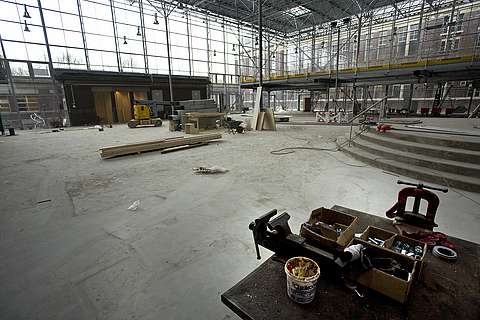Een soort apenrots voor studenten. Dat is de functie van de grote houten trap die in de oostelijke serre van Bouwkunde wordt gebouwd. Maar dat niet alleen.
Binnenin het bouwwerk, dat ‘The why factory tribune’ heet, komen ruimtes met grote schermen waar studenten kunnen werken en presentaties kunnen geven.
How do researchers and academic staff carry out their work?
– A short introduction on academic spatial needs and behaviour
The fire on 13th May was a terrible event for all of us. What has been missing so far in the response is a focus on the faculty’s academic staff and researchers, that is those who give lectures, carry out research and and/or run a research team or a section in a department. The efforts of our support team in facilitating temporary solutions in the short term and to provide good facilities for students have been magnificent so far. The teaching is running according to schedule. However, the content of the teaching and of research has to be provided by us, the academic staff. The delivery of high quality teaching and research depends on suitable facilities for a faculty’s academic staff. We like this to be acknowledged; we like to be consulted.
We did not only lose a building and a particular office containing all the memories from our daily working life, but we also lost our research materials, books, teaching and research archives, reports from students, journals and article library which was built up through years of research. This part has been poorly mentioned in the process after the fire. Likewise, in the plans for our temporary location in Julianalaan, the functional requirements and needs from the academic staff are hardly taken into account.
At this moment, when the teaching and research is starting, our homes are slowly converting into offices with all materials we need for the lectures, the research projects we are involved in, administrative archives, printers, etc. Deadlines for delivery of consultancy and research projects, like for example EU funded research projects, which involve partners from other countries, have to be followed. Likewise, scientific articles and reviews must be submitted in time. All this needs a particular working space with various facilities like a workspace a copy machine, desk phone, computer, secretaries, colleagues around and space to store materials.
As times goes by, most of us really miss seeing colleagues around in a building and at the same time to have one’s “own space” where we can work quietly and store our necessary materials. This is impossible with the proposed flexible office solution! Some of us are currently carrying our offices around with us – loads of documents and papers are carried from meeting to meeting. The proposals make this frustrating and time-consuming business permanent.
What an academic employee wants is very simple (?)
The design may have some importance; it is not the first thing. The typical tension between form and content is embodied in this issue. The flex solution may be suitable for the way some people work (for instance those who work only one or two days in Delft), but not for everyone. Many of us want to sit in an office with a table reserved for a particular person (to pile up our books and papers), our own chair set to our needs; screens good enough for our eyes; i.e. minimum ARBO requirements. Our own bookshelves (not only one meter but at least ten!), a wall to put on one’s own pictures (maybe one with a text saying “office sweet office”…), a window to look out to see some daylight, one or two nice colleagues in the same or adjoining office space (to share jokes and ideas with), and finally, it has to be fire safe… It does not require a lot of space. It needs only a proper spatial and functional organization in order to stimulate an inspiring, effective and well-functioning academic working environment.
Ir Andrew Borgart,
Ir Luki Budiarto
Fransisco Colombo
Dr Ana Maria Fernandez-Maldonado
Ir Anthony Fuchs
Ir Hein de Haan
Ir Bas Hasselaar
Dr Edward Hulsbergen
Dr Ina Klaasen
Ir Iwan Kriens
Dr. Lei Qu
Ir Maarten Meijs
Dr Akkie van Nes
Ir Lau Nijs
Ir Andrea Peresthu
Yulia S.Rashevskaya MSc
Dr Stephen Read
Dr Roberto Rocco de Campos Pereira
Dr Ir Remon Rooij
Drs Herman Rosenboom
Ir Jeroen van Schaick
Dr Ing Thorsten Schuetze
Dr Diego Sepulveda
Ir Egbert Stolk
Dr Ir Paul Stouten
Dr Ir Arjan van Timmeren
Ir Lidewij Tummers
Dr Ir Fred Veer
Dr Ir Liek Voorbij
Dr Ir Karel Vollers



Comments are closed.